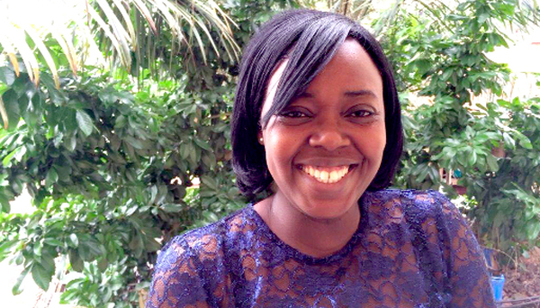GOAL’s Christine Sesay was born in Sierra Leone and left soon after for Nigeria where her father worked as a diplomat.
She came to Ireland when she was a teenager and completed her second and third-level education in Dublin, living with the Gray family in Stepaside.
Christine calls Ireland
‘home’ as much as Sierra Leone.
Last September, she returned to Sierra Leone with GOAL to work with some of the country’s poorest communities. Since June, she has been helping her native country combat the deadly Ebola virus and prevent further spread of the disease, and loss of life.
“Even though I am back working in the city where I was born, I still find it difficult to say where
‘home’ is.
“People see my surname and presume I’m Sierra Leonean, but I spent so much time living overseas, and particularly in Ireland, where I went to school and college, that Dublin is as much a home to me as Freetown.
“I was in Dublin when my dad passed away in 2002. I returned to Freetown for the funeral and since then I tried to return to Sierra Leone every two years. Now, it is my home again, at least for the next few years. I’m glad I am here to help my country in its time of need.
“It has been 16 weeks since the first confirmed case of Ebola in Sierra Leone.
“It is the first time that the country has experienced an outbreak of Ebola and although we have managed to educate many people about the disease, initially many believed almost anything they heard about supposed cures and preventative measures.
“For example, somebody started a rumour that people should wash with salt water in order to cure or prevent the transmission of Ebola.
“Thanks to text messaging and social media thousands of people were soon trying it. It took a couple of days before people eventually realised that saltwater was not an effective preventative measure, but it demonstrated how much fear and misinformation is still a big part of the problem.
“Awareness is no longer an issue here, as the community knows what Ebola is now, but there was lots of scepticism about Ebola when it first struck Sierra Leone.
“Some people felt it had been fabricated for political gain. Others believed that people were being purposely injected with the virus.
“It was only following the death of Sheik Umar Khan, the head doctor who had been fighting Ebola in Sierra Leone that people started to take it more seriously. That was a bit of a turning point and people are asking a lot more questions now.
“I spoke with a number of survivors of Ebola in Kenema last week and all of those I spoke with said that early detection of the disease contributed to their survival.
“The community knows that they must isolate themselves and get to a treatment centre immediately if they have symptoms of Ebola. The problem we now face is the treatment centre is overrun, under-staffed and underfunded.
“GOAL’s response is focused on distributing public health information, while also providing logistic and material support to government agencies and partner organisations.
“Prevention is the most important focus right now and we are working with people in communities where Ebola has not yet struck.
“The spread of Ebola can be stopped, but only with funding to support the activities of organisations such as GOAL.
?
